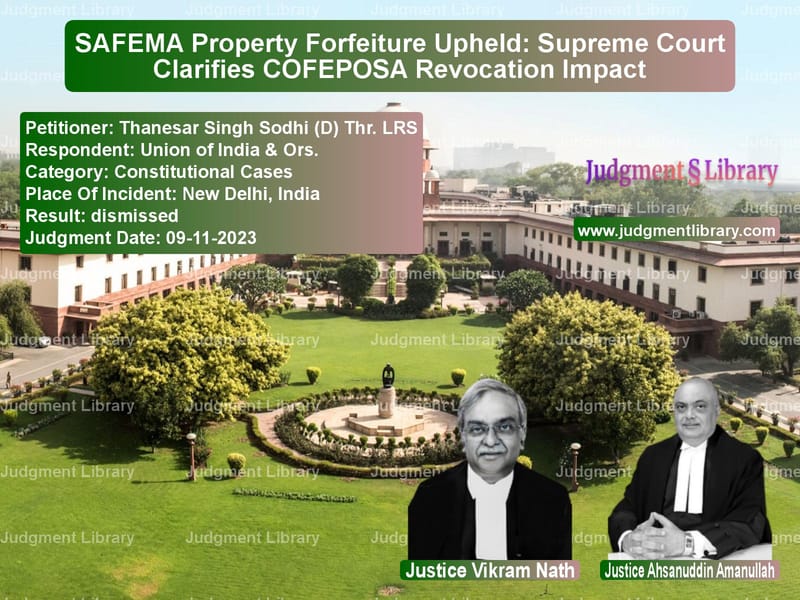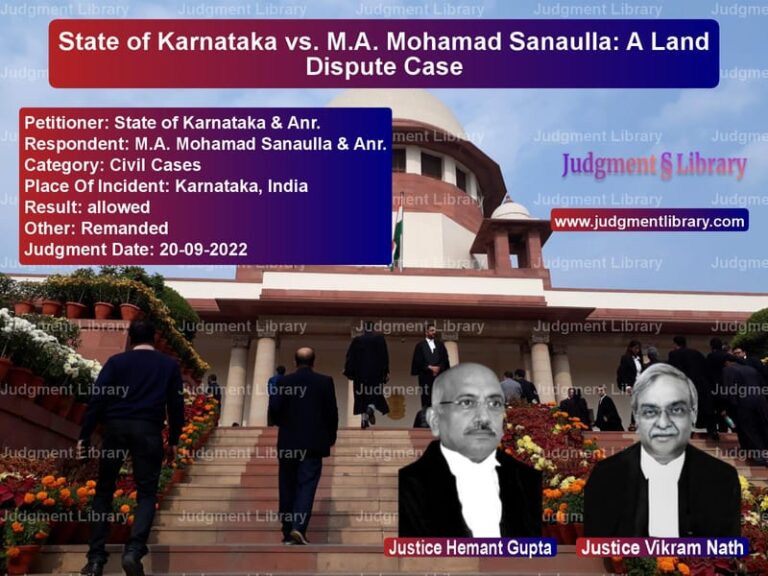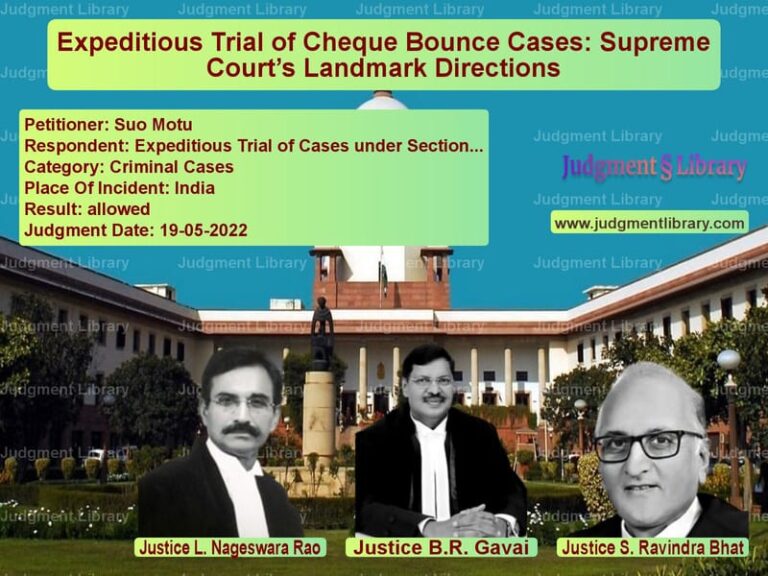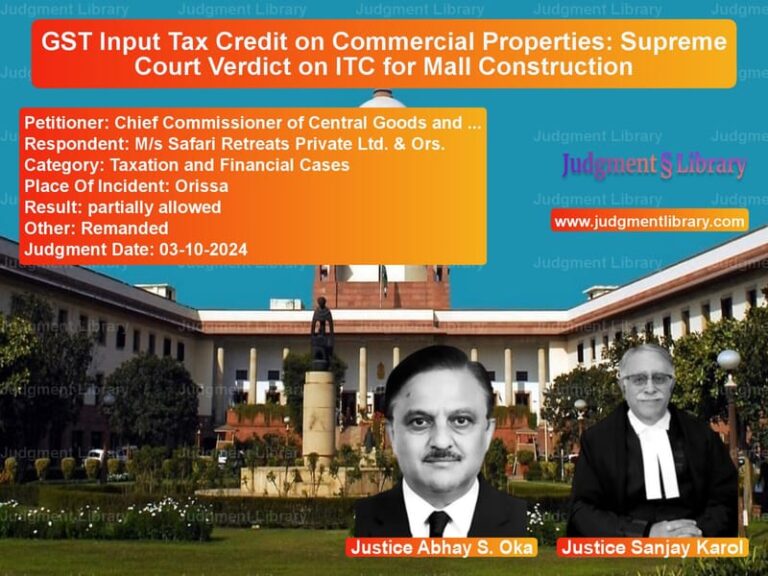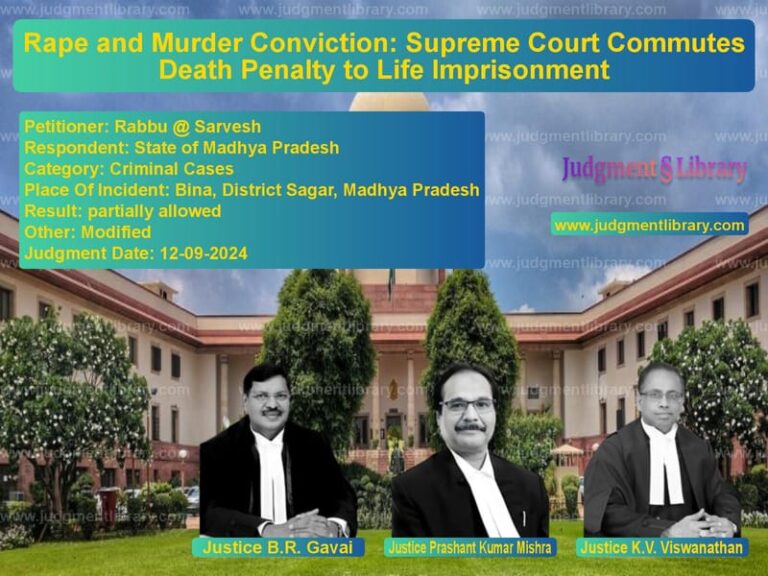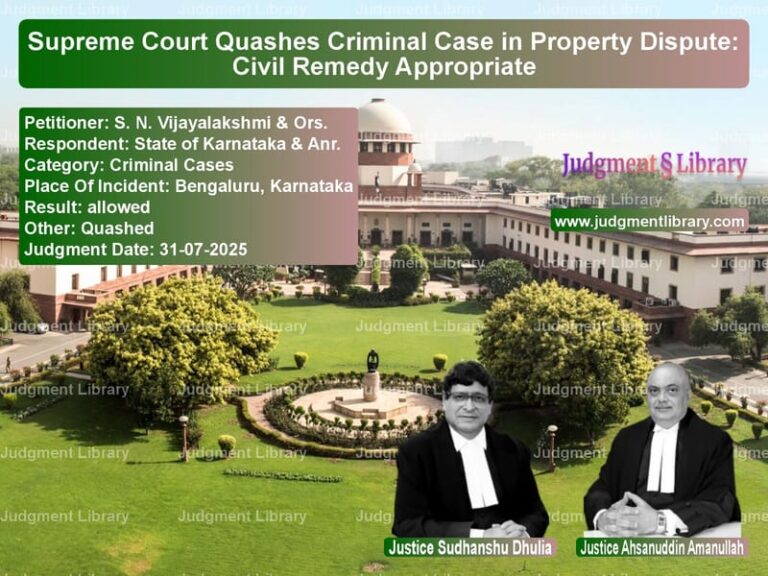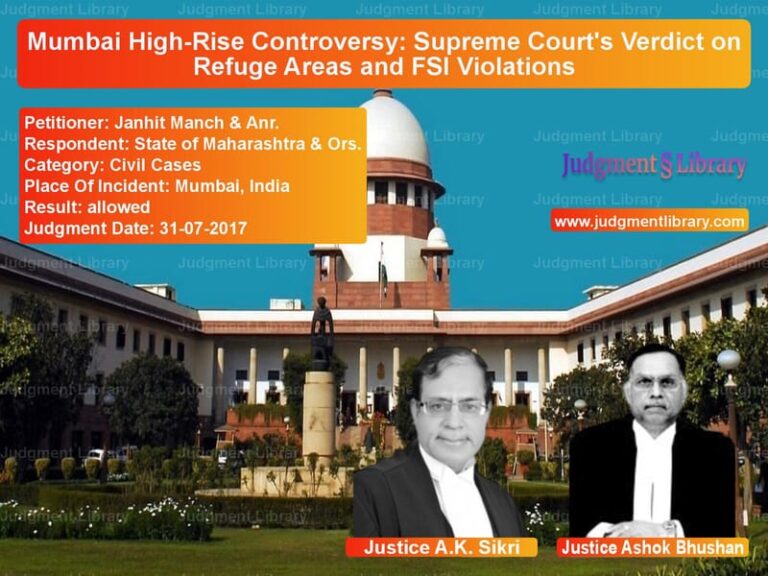SAFEMA Property Forfeiture Upheld: Supreme Court Clarifies COFEPOSA Revocation Impact
The case of Thanesar Singh Sodhi (D) Thr. LRS vs. Union of India & Ors. revolves around the applicability of the Smugglers and Foreign Exchange Manipulators (Forfeiture of Property) Act, 1976 (SAFEMA) when a detention order under the Conservation of Foreign Exchange and Prevention of Smuggling Activities Act, 1974 (COFEPOSA) is later revoked. The Supreme Court examined whether the revocation of a COFEPOSA detention order nullifies SAFEMA proceedings and upheld the forfeiture, reaffirming that revocation under certain conditions does not render SAFEMA inapplicable.
Background of the Case
The dispute in this case arises from the forfeiture of properties belonging to the appellant, Thanesar Singh Sodhi, under SAFEMA. Two appeals were filed:
- Civil Appeal No. 5500 of 2011: Challenging a Delhi High Court order upholding property forfeiture under SAFEMA.
- Criminal Appeal No. 730 of 2014: Challenging a Bombay High Court order that dismissed a writ petition against property forfeiture.
The primary contention of the appellant was that since his COFEPOSA detention order had been revoked, the proceedings under SAFEMA should also be deemed invalid.
Petitioner’s Arguments
The appellants, represented by senior counsel, raised the following key points:
- Revocation of the COFEPOSA detention order: The detention order against the appellant was revoked, and as per the appellant’s interpretation, once the detention order ceased to exist, proceedings under SAFEMA should also be nullified.
- Criminal case under the Customs Act, 1962: The appellant had been discharged in the customs-related criminal case, which he argued further weakened the foundation of the SAFEMA proceedings.
- SAFEMA should only apply if a person is detained or convicted: Since his detention order was revoked, the appellant argued that the proceedings under SAFEMA could not continue against him.
Respondent’s Arguments
The Union of India, defending the forfeiture, made the following counter-arguments:
- SAFEMA applies once a COFEPOSA detention order is issued: The mere issuance of a detention order is enough to trigger SAFEMA, regardless of its subsequent revocation.
- Conditions for nullification of SAFEMA were not met: Section 2(2)(b) of SAFEMA lists specific scenarios in which revocation of COFEPOSA detention would invalidate forfeiture, and the appellant’s case did not fall under any of these exceptions.
- SAFEMA is independent of acquittal in criminal cases: The appellant’s discharge in a criminal case did not impact the validity of forfeiture proceedings under SAFEMA.
Key Legal Issues Considered
1. Does Revocation of COFEPOSA Detention Nullify SAFEMA Proceedings?
The Supreme Court analyzed Section 2(2)(b) of SAFEMA, which outlines four conditions under which SAFEMA proceedings become invalid. The Court found that none of these exceptions applied to the appellant.
2. Does Acquittal in a Customs Case Impact SAFEMA Proceedings?
The Court examined whether an acquittal in a criminal case related to customs offenses could affect SAFEMA forfeiture. It ruled that the two proceedings are independent and that forfeiture can proceed regardless of a criminal acquittal.
3. Is SAFEMA Constitutionally Valid?
The Court reaffirmed that SAFEMA is constitutionally valid and that its provisions apply to persons targeted for economic offenses.
Supreme Court’s Verdict
The Supreme Court ruled in favor of the Union of India and upheld the forfeiture of the appellant’s properties. Key observations included:
- SAFEMA remains applicable once a COFEPOSA detention order is issued, even if the detention order is later revoked.
- The appellant’s revocation was not under any of the four specific exceptions listed under Section 2(2)(b) of SAFEMA.
- Property forfeiture under SAFEMA is not dependent on conviction or detention in a criminal case.
- The Delhi and Bombay High Court decisions upholding the forfeiture were correct and required no interference.
Key Takeaways from the Judgment
- Revocation of COFEPOSA Detention Does Not Automatically Nullify SAFEMA: Only specific conditions under Section 2(2)(b) can make SAFEMA inapplicable.
- Criminal Acquittal Does Not Affect SAFEMA Proceedings: Even if an individual is acquitted of criminal charges, SAFEMA forfeiture can still proceed.
- Judicial Precedents Uphold SAFEMA’s Validity: The Supreme Court reiterated that SAFEMA is a valid legal tool for combating economic offenses.
- Government’s Authority to Forfeit Property Reinforced: The ruling strengthens the government’s ability to act against economic offenders through property forfeiture.
This decision reinforces the principle that economic offenders cannot evade liability by challenging their COFEPOSA detention orders, ensuring strict enforcement of anti-money laundering laws.
Petitioner Name: Thanesar Singh Sodhi (D) Thr. LRS.Respondent Name: Union of India & Ors..Judgment By: Justice Vikram Nath, Justice Ahsanuddin Amanullah.Place Of Incident: New Delhi, India.Judgment Date: 09-11-2023.
Don’t miss out on the full details! Download the complete judgment in PDF format below and gain valuable insights instantly!
Download Judgment: thanesar-singh-sodhi-vs-union-of-india-&-ors-supreme-court-of-india-judgment-dated-09-11-2023.pdf
Directly Download Judgment: Directly download this Judgment
See all petitions in Fundamental Rights
See all petitions in Public Interest Litigation
See all petitions in Judgment by Vikram Nath
See all petitions in Judgment by Ahsanuddin Amanullah
See all petitions in dismissed
See all petitions in supreme court of India judgments November 2023
See all petitions in 2023 judgments
See all posts in Constitutional Cases Category
See all allowed petitions in Constitutional Cases Category
See all Dismissed petitions in Constitutional Cases Category
See all partially allowed petitions in Constitutional Cases Category

